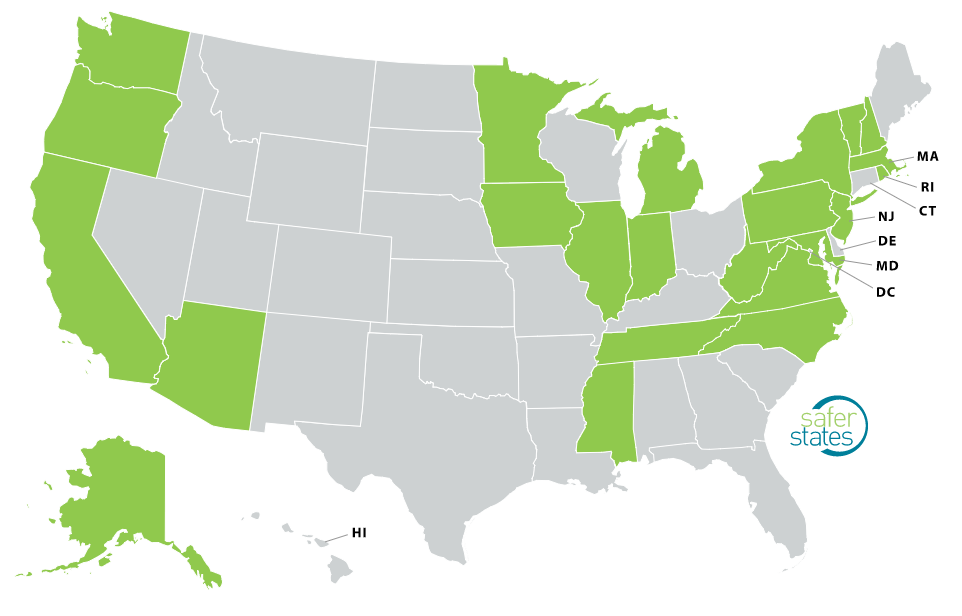Bans on Nonstick PFASs, Toxic Flame Retardants Top Issues as States Work to Fill Chemical Protection Gaps
(Portland, OR) – State legislatures across the country are stepping up to protect public health from harmful chemicals in an effort to fill gaps in chemical protections due to inaction by the US EPA, according to an analysis of state policies by Safer States. The analysis found that at least 23 states will consider 112 policies to limit exposures to toxic chemicals, including bans on nonstick PFAS chemicals and toxic flame retardants. The analysis, including a searchable state toxics policy database, is available online at saferstates.com/bill-tracker/.
Despite an overhaul to the nation’s primary chemical safety law in 2016 that was intended to fix the broken chemical regulatory system, the U.S. Environmental Protection Agency (EPA) has largely failed to take meaningful action to restrict toxic chemicals. For example, in the last year, the EPA rewrote a rule to make it more difficult to track the health impacts of PFOA, a chemical linked to cancer and other health effects, despite its presence in the drinking water of over 6 million Americans. The agency has also shelved plans to regulate a deadly chemical in some paint strippers despite increasing reports of fatalities associated with the use of the chemical.
“States are doing what the federal government is not: protecting the health of families by pursuing stronger protections against harmful chemicals,” said Gretchen Salter, Interim Director of Safer States. “As scientists and scientific authorities reinforce the importance of strong protective chemical policy, states are poised to continue their tradition of leadership.”
“States must deal with the real world consequences of chemical pollution. From undrinkable water to contaminated residents to huge costs of clean up, we don’t want to be left holding the bag. Preventing these problems is the best solution,” said Washington State Representative Joe Fitzgibbons (D-Burien), Chair of the state’s House Environment Committee.
A recent study by Harvard University showed that costs associated with environmental chemical exposures worldwide may exceed 10% of the global gross domestic product. “Chemicals that cause cancer and other diseases are costing us dearly, burdening our health care system and sending families into turmoil—much of which could be prevented with common sense reforms to chemical policies,” continued Ms. Salter. “States are stepping up to make sure that their residents, particularly those in low-income communities often over-burdened by pollution, no longer have to pay the price for chemical contamination.”
According to Safer State’s analysis, states will consider the following policies in 2018:
- Banning flame retardants from furniture and kids’ products. At least 15 states will consider policy to eliminate toxic flame retardants from residential furniture and children’s products. A recent warning by the federal Consumer Product Safety Commission to avoid a particularly harmful class of flame retardants called organohalogens is moving states to regulate these harmful chemicals in electronics, mattresses, children’s products, and furniture. States considering bans include: AK, CT, IA, IN, MA, MD, MN, MS, NC, NJ, NY, TN, VA, WA, and WV.
- Banning nonstick PFAS chemicals in food packaging: At least 7 states will consider policy to eliminate or reduce PFASs in food packaging. PFASs are industrial chemicals used in nonstick coatings on food packaging like microwave popcorn bags and fast food wrappers. They have been shown to cause cancer and organ damage as well as interfere with normal development and limit the efficacy of vaccines. The chemicals don’t stay in the food packaging but instead move into the food where we are exposed when we eat the food. Studies also show that when PFAS-coated food packaging is composted or landfilled, the chemicals get into the environment. States considering bans include: CA, NJ, NY, PA, RI, VT, and WA.
- Restricting PFAS in drinking water: At least 7 states will consider policy to limit levels of PFAS in drinking water, as well as ban the use of PFAS-containing firefighting foam, fund cleanup of contaminated drinking water, including medical monitoring and testing. Over 4 million Americans are dealing with drinking water contaminated with PFAS chemicals. Sources of contamination include chemical manufacturing plans and PFAS-containing firefighting foam used at airports and training facilities. States considering actions include: MI, NC, NH, NY, PA, VT, and WA.
- Identification and disclosure of toxic chemicals: At least 7 states will consider policy to identify chemicals of concern and/or require makers of consumer products to disclose their use of these chemicals. State disclosure laws have proven effective in providing policymakers with an understanding of how people are exposed to chemicals from products, with particular recognition of greater exposures among low-income communities and communities of color. These laws also inform consumers about their buying choices and help manufacturers identify chemicals to eliminate in their products. Disclosure bills being considered will address various product sectors including fragrance disclosure, cleaning ingredient disclosure and disclosure of toxics in children’s products including electronics. States considering actions include: AK, CA, MA, MS, NC, NY, and RI.
Since 2000, more than 35 states have passed 173 policies that establish state chemicals programs, identify, limit or ban the use of harmful chemicals in products including baby bottles, furniture, electronics, toys, cosmetics and cleaning products.
The complete analysis is available online at saferstates.org/bill-tracker/.
###

